This year, we have seen a plethora of space and musical-themed games. Still, Philharmonix from Archona Games goes slightly further by combining these two in an epical space adventure. Every player leads a space orchestra touring and performing symphonies throughout the galaxy. This game goes above and beyond to bring you the whole experience of what it is like to be the band manager, of a touring space orchestra. You will hire musicians, compose symphonies, perform in different worlds, and maybe attract the attention of a wealthy patron. The galaxy has never been louder, and in the end, only the most prestigious band will triumph.
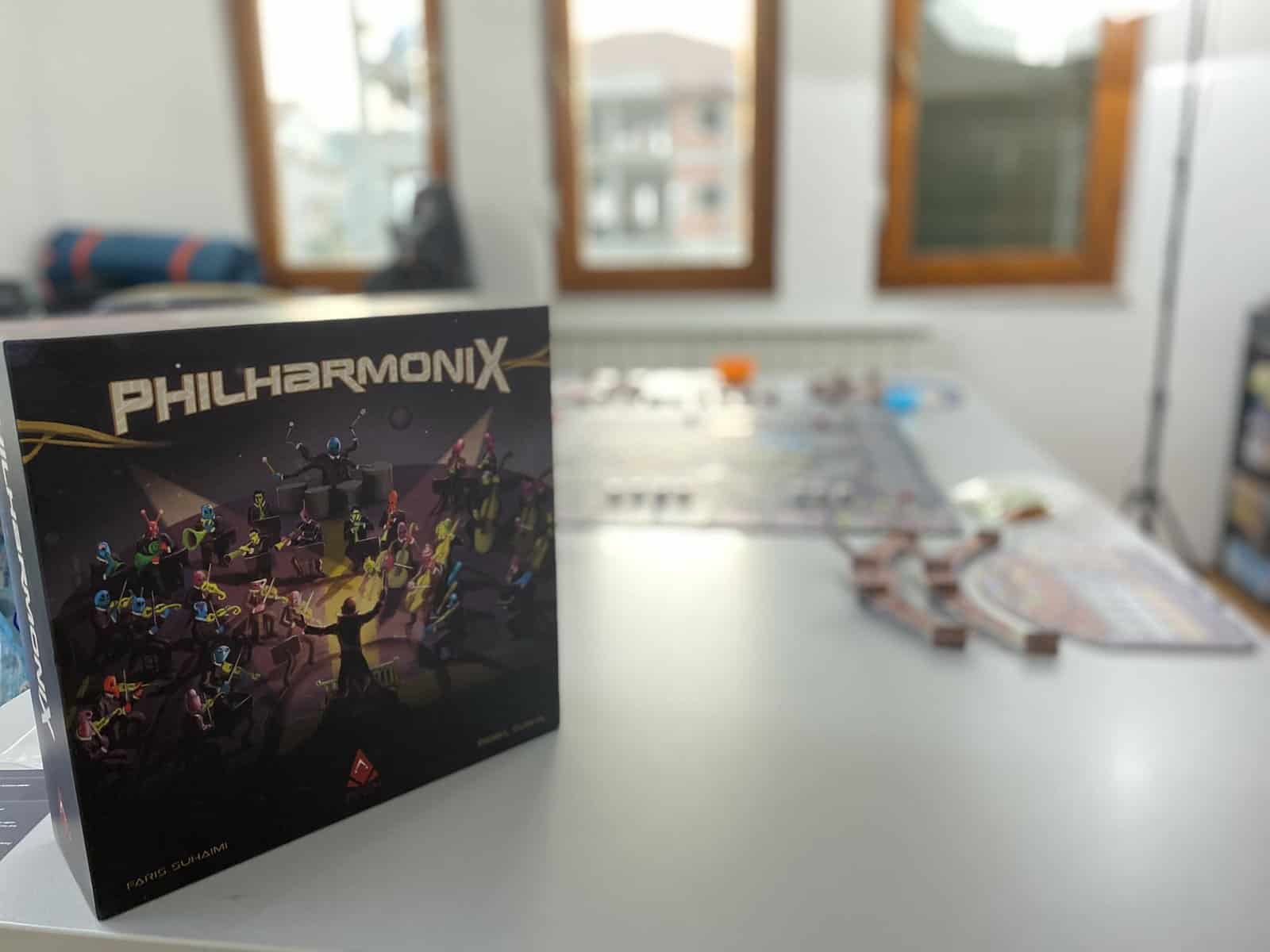
Gameplay & Mechanics
At its core, Philharmonix is a worker placement game for 2 to 4 players, but the only difference is that there is only one worker to place, which must move from action to action and never stay in the same space. Players carefully choose one of six actions each turn, spending their limited action points to activate abilities. In each round, there is a random setup on which actions are more potent and which ones are weaker. More advanced actions cost additional points, forcing tough choices on what you can afford. This snappy and tactical action selection creates great decision tension each round.
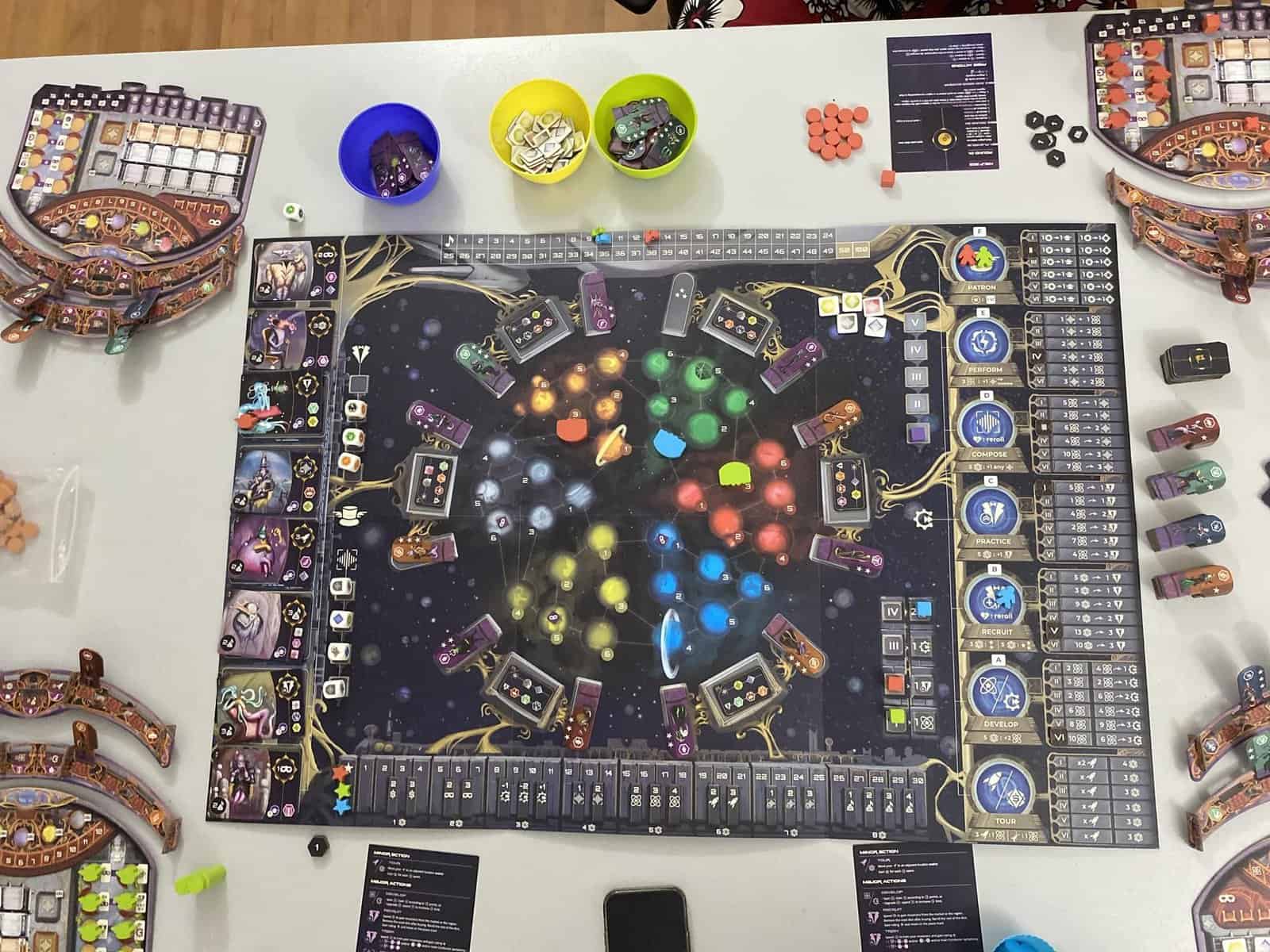
With musicians and action costs randomly determined each round, you must adapt your strategy on the fly, keeping players engaged. Choosing when to compose, upgrade abilities, or recruit band members provides a satisfying strategy. Also, you need to be careful in collecting the necessary resources to be able to do the actions that you want to do. For our playthrough, the most common phrase was, “If I only had one more experience point…”
Moving your ship around the map to hire special musicians and take advantage of demand tiles adds rewarding spatial planning. Optimizing your travel route is vital, but blocking opponents also proves useful, and if you are a cunning player, you can do both. The tour action can be played at any location instead of the regular action, thus allowing you to deprive some players of their next move. However, the penalty for blocked spaces is not that harsh, but in the grand scheme of things, it might matter in the end.
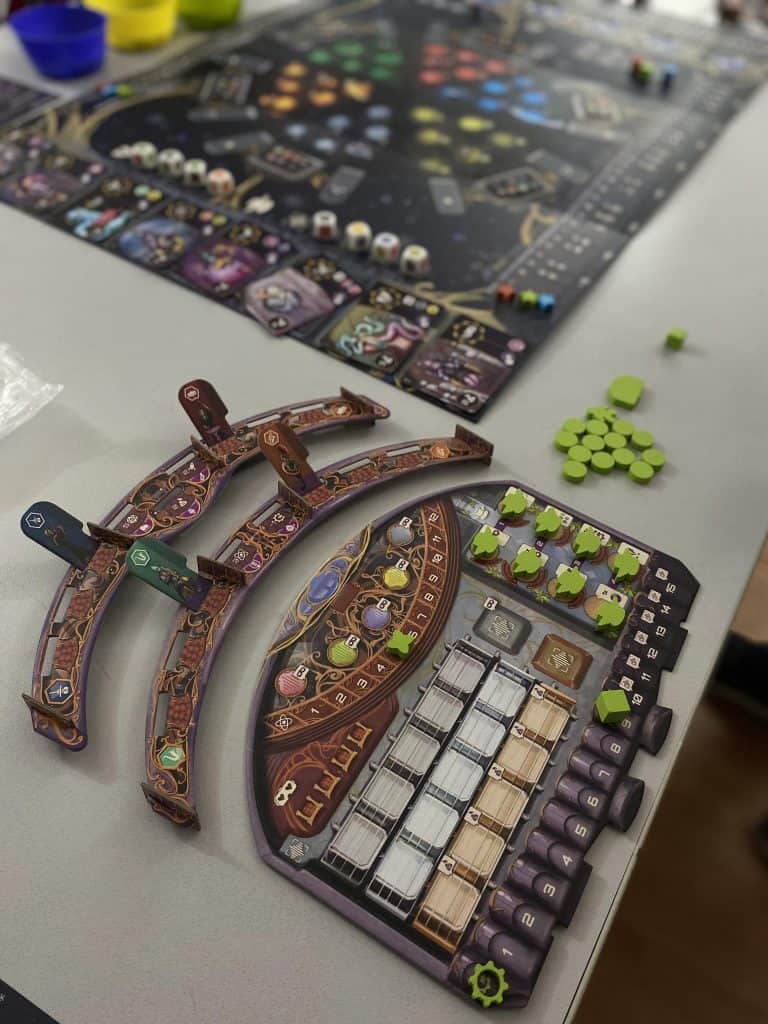
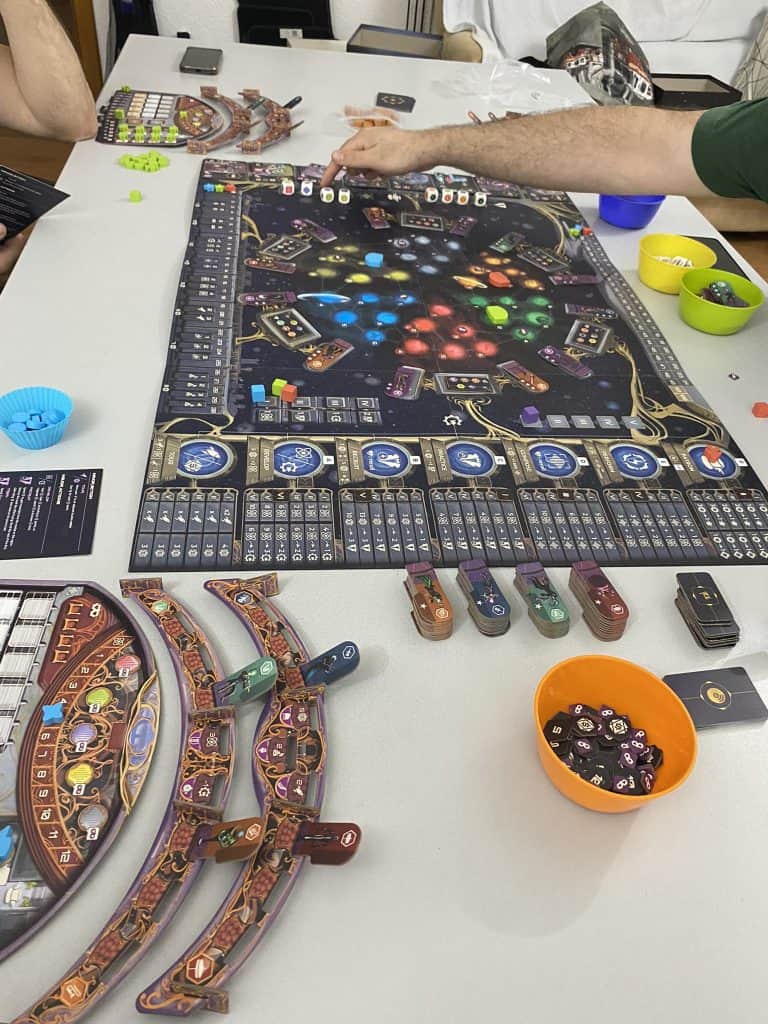
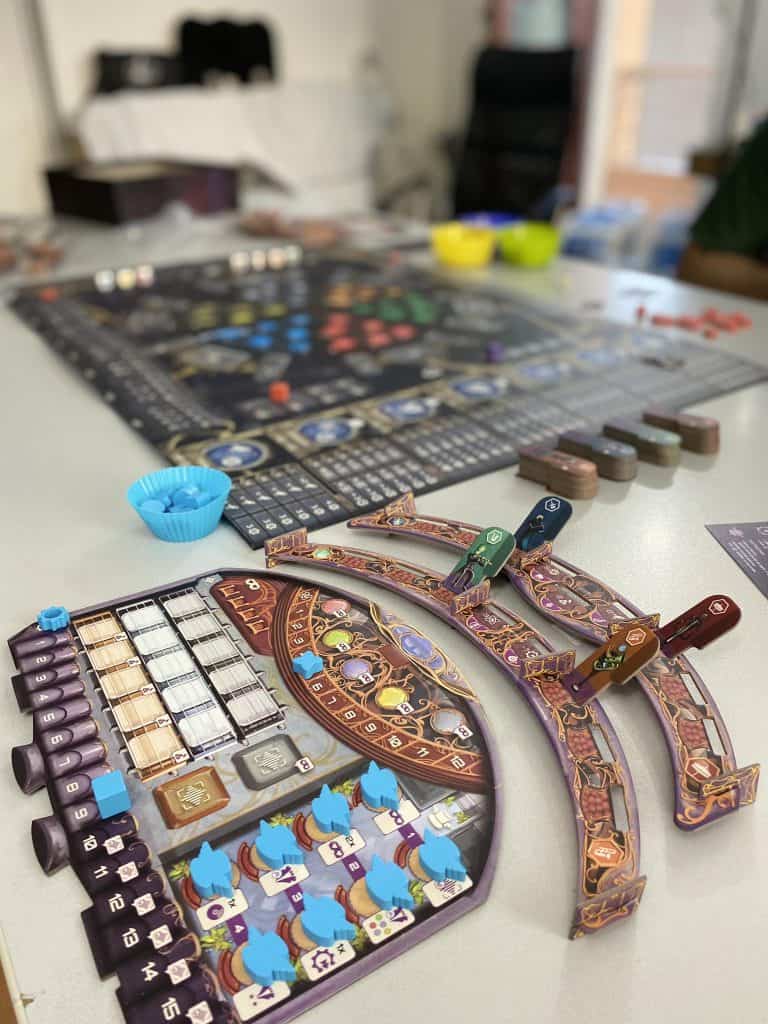
A dynamic element of Philharmonix lies in its unpredictability, as musician availabilities and action costs fluctuate. It’s a dance of strategy and adaptation, keeping players riveted. Like any euro game, the start is slow and gradually picks up like a beautiful crescendo. Players will struggle in the first two rounds just to put the band together, and if they are lucky, they might hit a perfect performance, but not likely due to their limited resources. Nevertheless, once they pick up a few more band members and play a few gigs here and there, it is a race to the finish in multiple scoring opportunities:
- Prestige collected during the game
- Most performances in a given sector
- End of game score cards for symphonies (Golden & Silver records)
- Having leftover money buys you a small amount of prestige, too
We loved the musicians’ dice-based system, with stars denoting talent, presented on the band rating track. Collecting stars unlocks powerful rewards when hitting milestones, which is incredibly satisfying after patiently upgrading your orchestra. Consequently, this is another race that players should pay attention to because the rewards are limited.
The board itself becomes a celestial chessboard as players maneuver their ships, scouting for unique musicians and picking up some fans along the way. But it’s not just about your moves; anticipating and occasionally thwarting your rival’s plans is part of Philharmonix’s charm. Predominantly if they are about to do a perfect performance and you get there before they do.
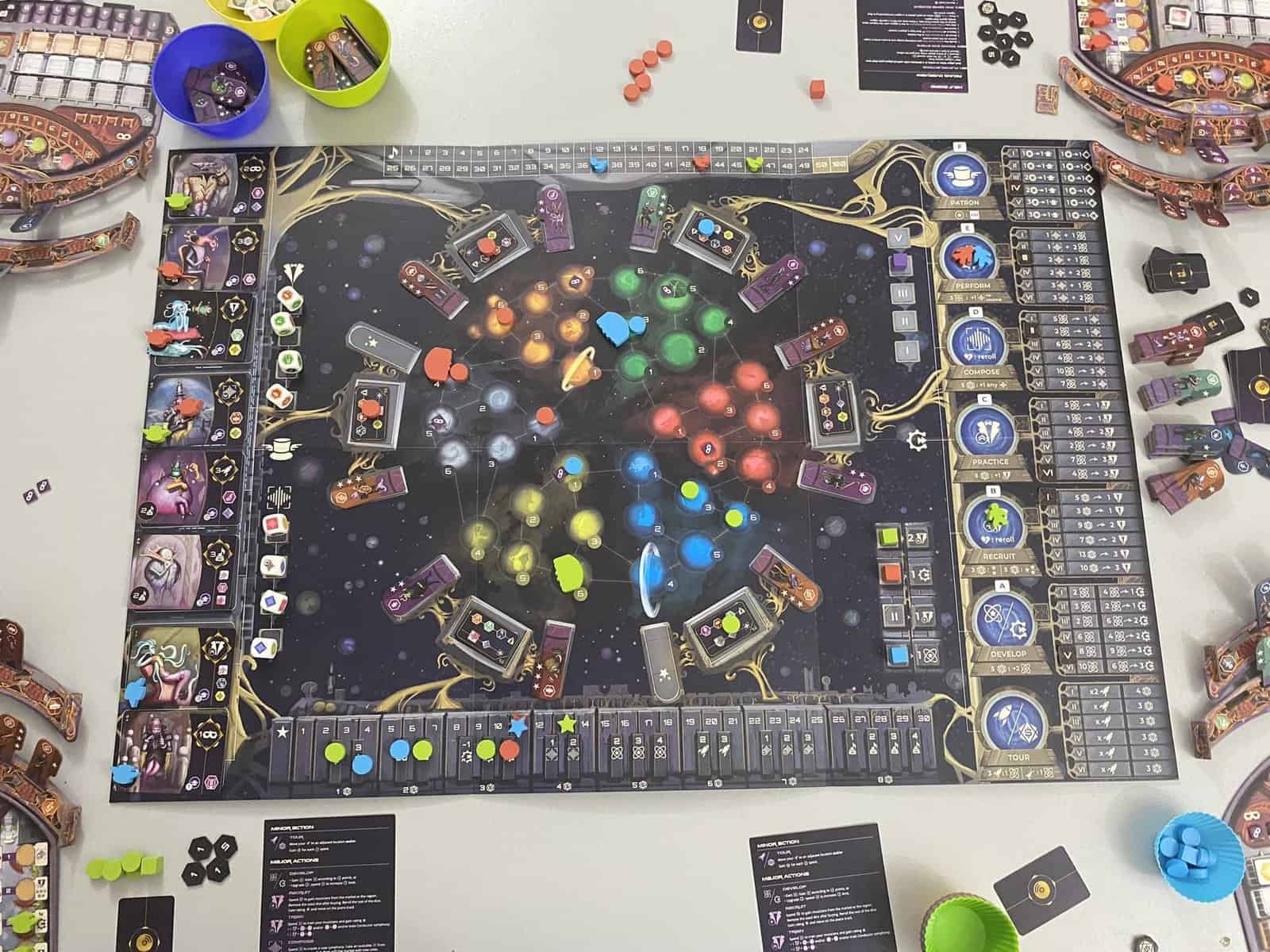
The symphony tiles provide a wonderful engine-building element. Choosing which symphonies to compose is an essential part of Philharmonix because they can score you points in multiple ways. It is a bird in a hand or two in the bush. Do you keep this symphony with the intent to promote it to golden hit later, or do you promote it to silver now and reap the benefits? These types of decisions are a lot of fun for us.
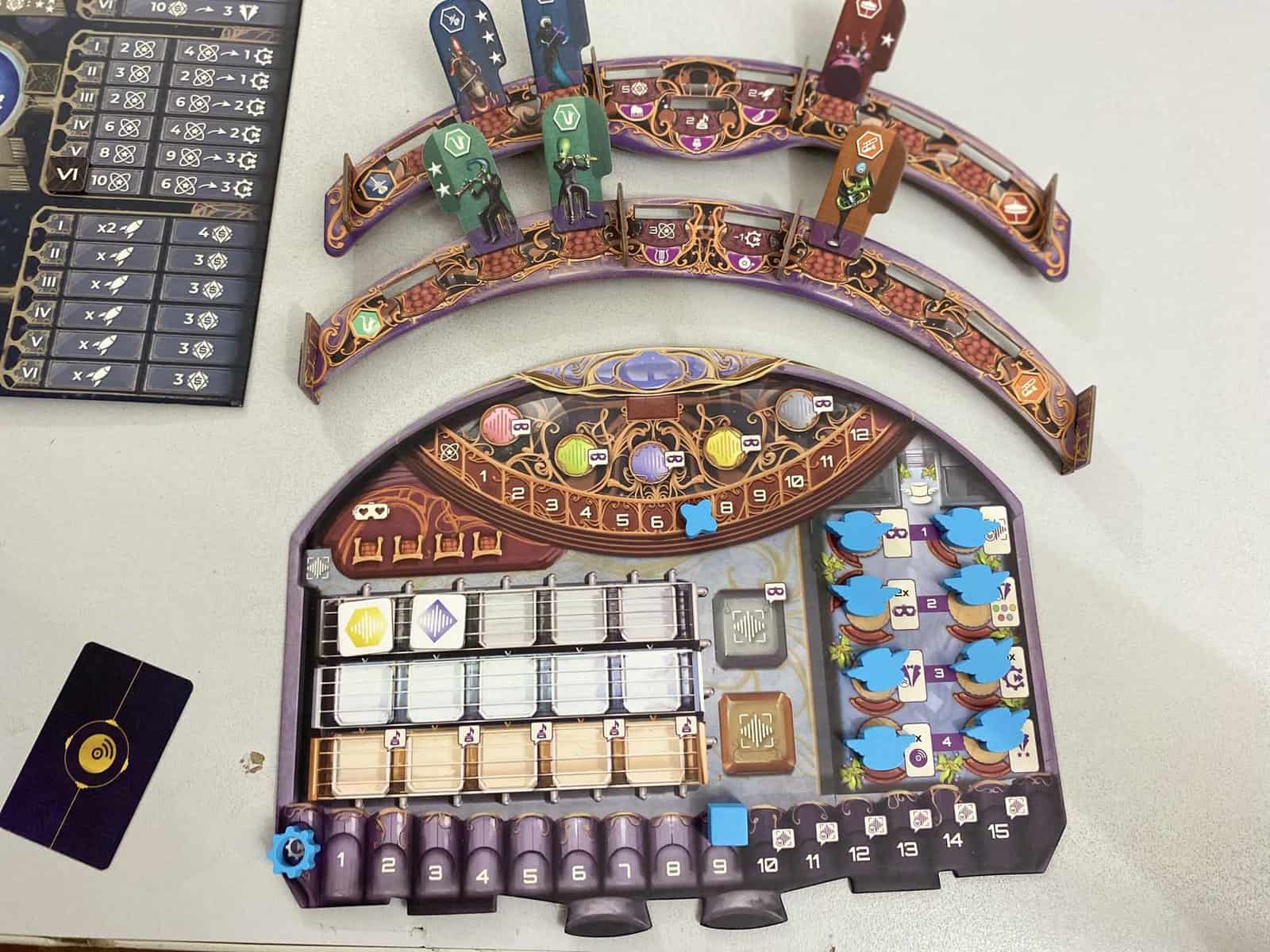
The demand tiles for each sector are the driving engine of Philharmonix . As your orchestra grows and evolves, hitting certain milestones feels like a well-deserved standing ovation. Every demand tile has specific goals, like the types of symphonies that need to be played and by what kind of band members. Additionally, the level of the band members has to be matched, too. You are not required to hit all of the goals, but the more you do, the more points you will score.
Finally, if you can’t keep up with the other players or you like to mix it up, you can try to get the attention of a wealthy patron. You can do that in 2 ways, either by taking the specific action or by performing the requirements that they want to hear. Patrons provide various benefits like movement, money, experience, or even a new band member. Also, claiming a patron unlocks some benefits, which get progressively better the more patrons you claim. Naturally, this is also a race because being the first to befriend a specific patron gets you some prestige points, too.

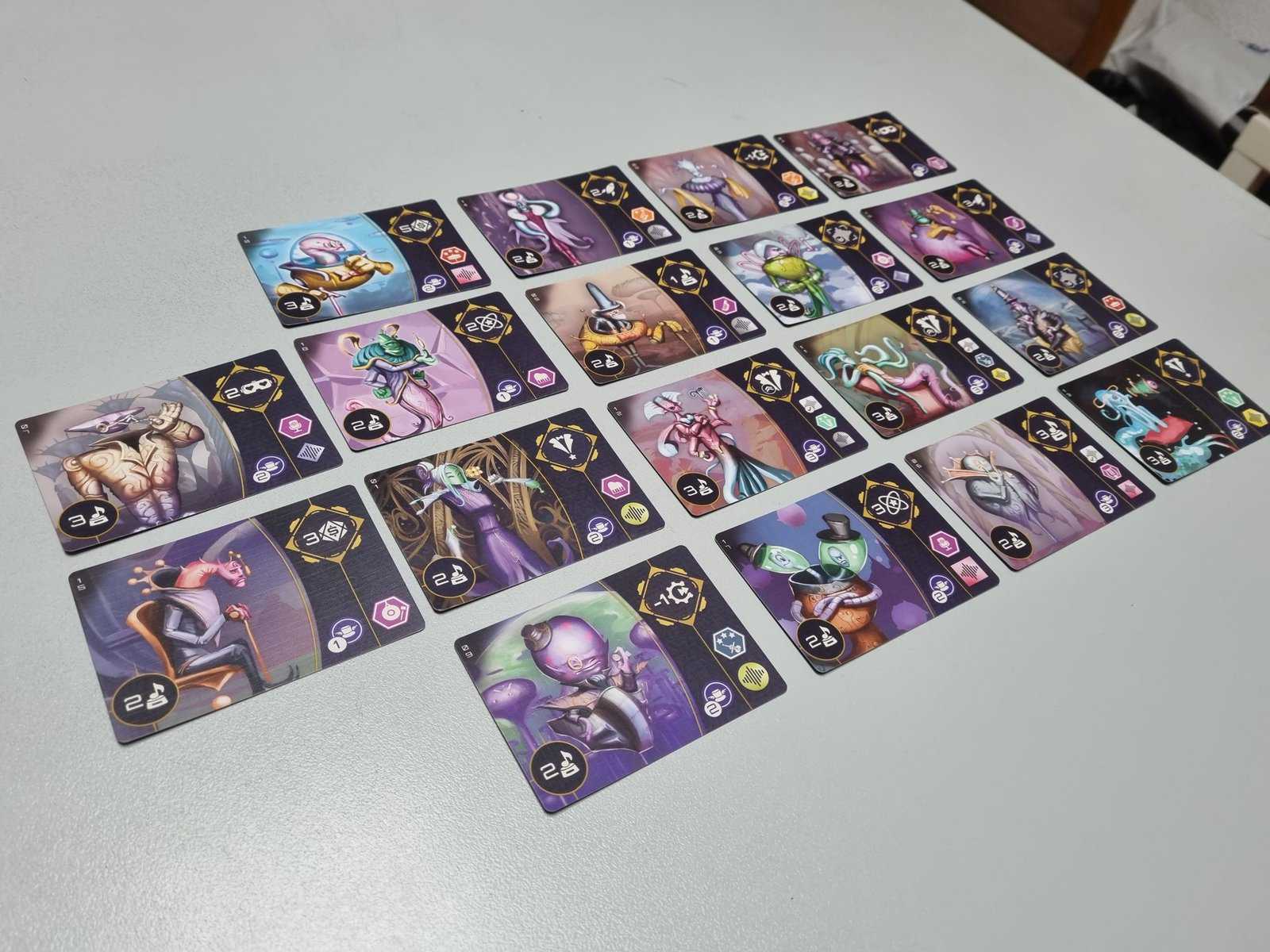

Art and visuals
Philharmonix excels at bringing its musical and space theme to life, from the piano keyboard track to the different species of band members. The quirkiness is further amplified by the extraterrestrial patron designs, which never fail to draw a chuckle. The spaceships traversing the colorful galaxy map give a delightful sci-fi twist to the orchestra premise. The player board is also the same shape as the ship meeple, which increases the immersion even further.
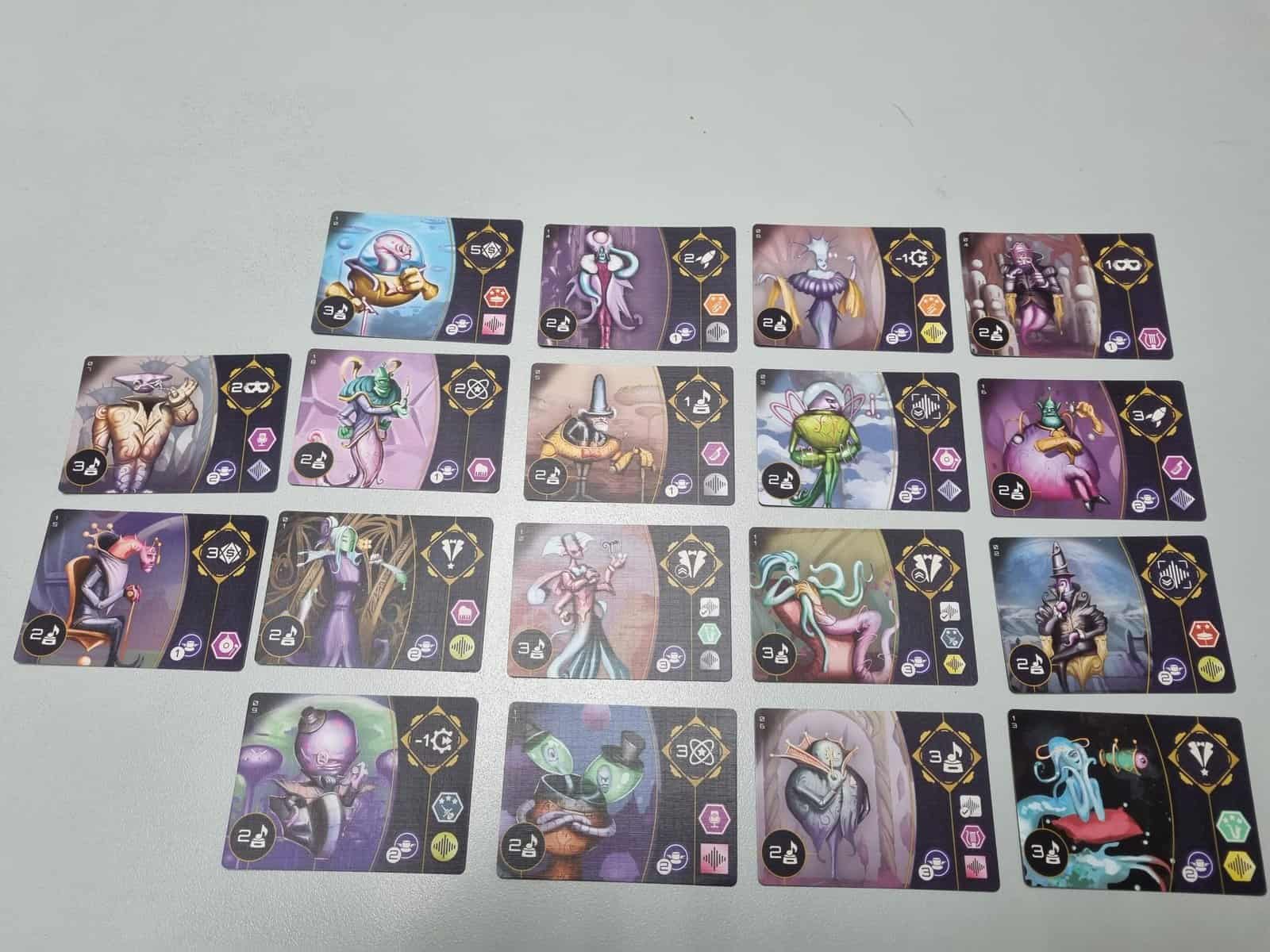
The illustrations shine with character, and the prototype components we tested felt high-quality. However, some of the iconography could have been clearer, so the reference sheet is indispensable for the first few games. Also, the Roman numerals can be challenging to recognize, especially when players see the game from different angles. However, this could easily be surpassed by putting the action point tiles in their respective rows so everyone could see which row they should look at. Despite that, we had only a prototype, and by the time the game is out, this might not be an issue. Another essential detail is the record cards, which are end-of-game goals. It is a small detail but very thematic, making the players feel like they are producing golden and silver musical hits. The conductors were also nicely done and easily recognizable to which symphonies they refer.
Finally, the main components that stand out are the Musician Stages. We had a lot of fun setting these up, and when they were finally done together with our starting orchestra, it felt like a grand opera was about to start.
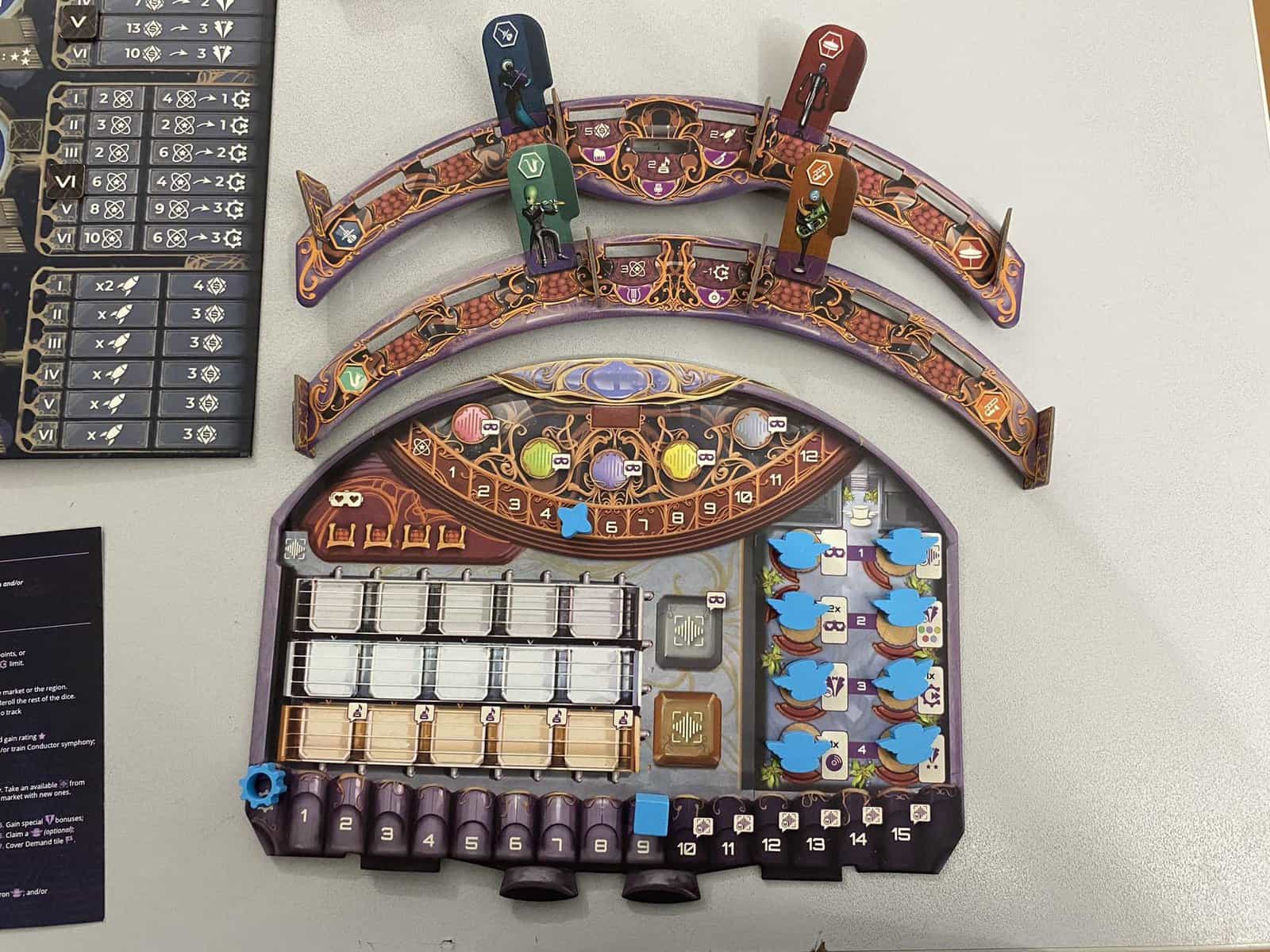
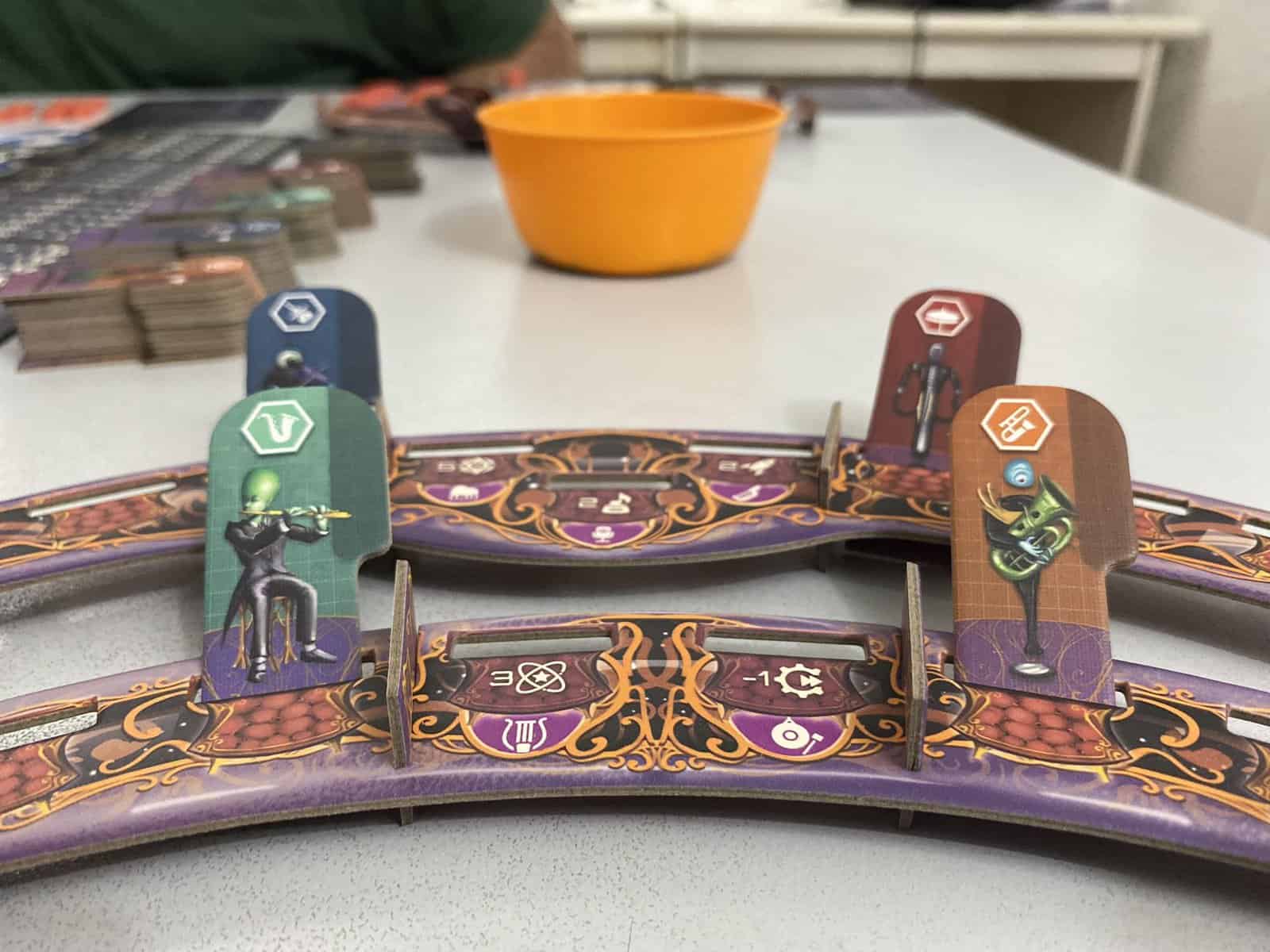
Playthrough
Across many plays of Philharmonix, we’ve been consistently impressed by how it combines action selection, route planning, and engine building into one harmonious experience. The game delivers tough choices, rewarding progression, and just enough luck to keep things exciting. Initially, we felt that there was too much luck in the recruitment action until we realized that you can reroll dice by spending fans. Symphonies, on the other hand, were easier to acquire, making this action a lower priority at the start, but with dice rolling, you never know. Despite the dice rolls being the main engine, your decisions still feel impactful, whether fine-tuning your orchestra or optimizing travel. The demand tiles and record card goals satisfied our desire for meaningful progression.
The area control aspect of the game felt a bit light because there were many planets, and every player was doing their own thing in their sector instead of trying to gobble up planets from other players. Maybe we were not incentivized enough by the 3-point reward, or perhaps we are still learning how to play the game. Then again, we had one playthrough where one player was touring nonstop, gathering fans, and performing in every sector, which was tons of fun. She didn’t win but came very close.
FINAL SUMMARY
Philharmonix has become our go-to midweight eurogame, working perfectly as the main event on game nights. The variability ensures it stays engaging after many plays. We’ve enjoyed tailoring different strategies, although specializing in perfect performances proved most fulfilling for my play style. There was one player who raced to get the patrons, ignoring the performances for a couple of rounds, which also proved to be an effective strategy mainly because he was alone in this race.
Many aspects of the game felt in the right place, like the development of the symphonies, the touring through the galaxy and making money, getting the band together and seating them in the appropriate spaces, and so on. The beautiful artwork also helped a lot, even though we had only a prototype.
Philharmonix is a game worthy of any collection, sure to hit the high notes with fans of engine builders, action selection, or merely magnificent music. Just don’t be surprised if you find some melodies stuck in your head long after gameplay concludes. We eagerly anticipate the final published copies from kickstarter and this original composition will stay in our collection for many concerts to come.

